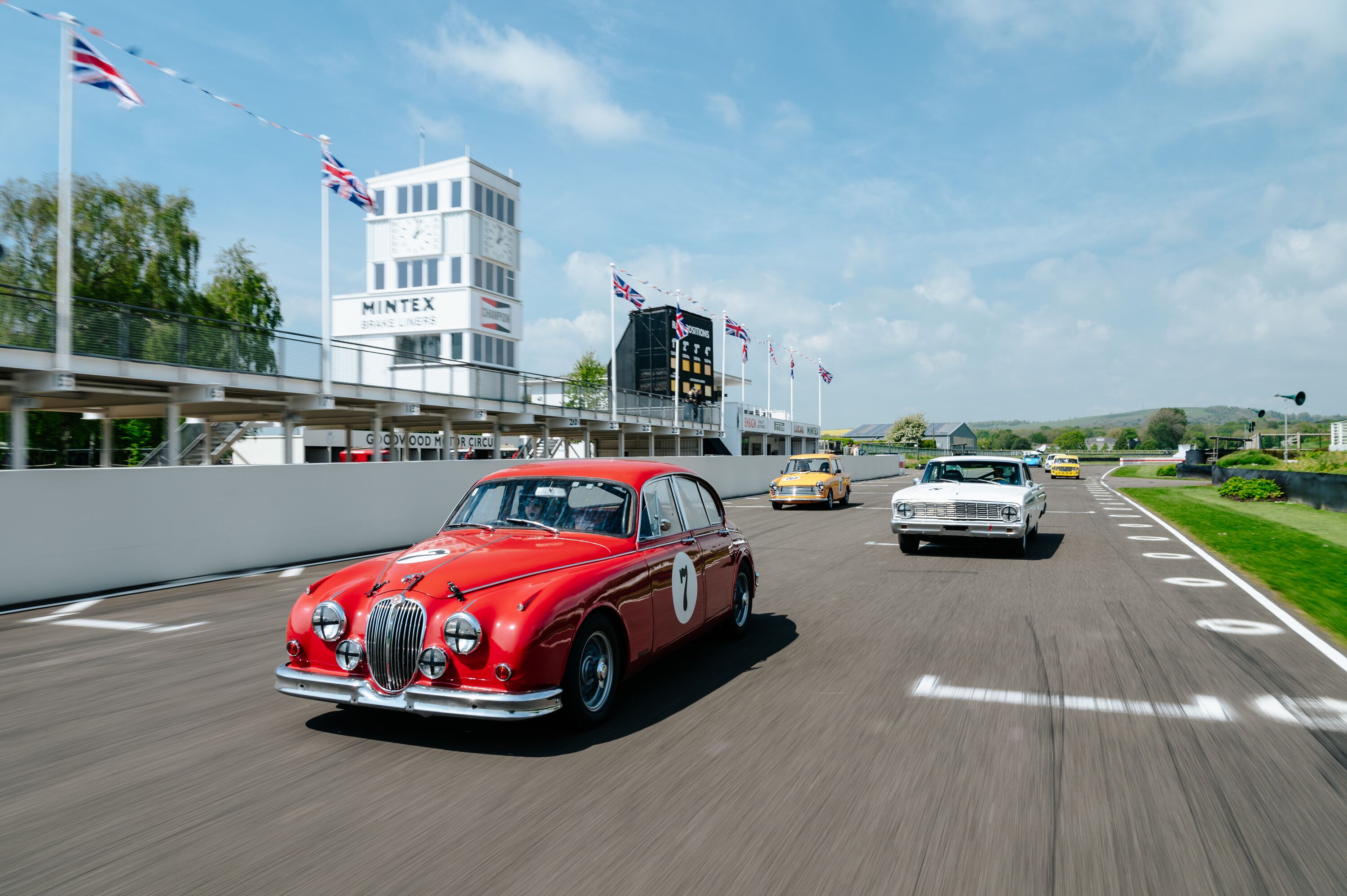The 10 best RWD cars on sale
Time was rear-wheel-drive cars seemed an endangered species but, as we’ll see, the electric age is inspiring something of a rebirth. More on that shortly. Before that let’s consider the fixation with a mechanical layout that has been around for the best part of a century. Not knowing any better and nostalgia may be contributory factors but, for keen drivers, it’s a more question of balance and feedback. Front wheels for steering and rears for propulsion remains about the most satisfying way of getting a car round a corner for those who care to apply themselves to it, the wonderful interplay of steering wheel, pedals and seat of the pants still the purest way to enjoy a car. Here are the ones in the market now that do it best.

BMW M3 and M4
Remember when the idea of a BMW putting its power to the road through anything other than the rear wheels would have been an anathema? Given front- and all-wheel-drive cars probably now outnumber rear-driven ones in the BMW range possibly not. Even the new M3 and M4 will be available with all-wheel-drive, should you want such a thing. Given the previous version inspired clammy palms when driven on anything other than smooth, dry tarmac that’s probably a response to customer demand. But also ironic, given the ‘proper’ rear-wheel-drive versions of new M3 and M4 iron out all the fear and deliver purely on the fun of putting 510PS (376kW) to the road through the back axle. Sure, there are armfuls of oversteer there if you want it. But it’s actually more satisfying to appreciate the subtler benefits of a sharp, reactive throttle, clever active diff and a front end with enough bite to let you play with the balance without even a whiff of tyre smoke. Glorious.

Porsche Taycan
Oddly the saviour of rear-wheel-drive as a mainstream mechanical layout may in fact turn out to be the switch to electric power. The flexibility of packaging batteries, powertrain and control systems actually makes it more attractive to put the motors in the back for many manufacturers, meaning more and more EVs are using a rear-driven configuration. Mostly this is for packaging reasons. But in a 476PS (350kW) Porsche it becomes something more entertaining. All-wheel-drive Taycans with additional motors at the front may accelerate harder. But the balance of the ‘basic’ rear-wheel-drive one is arguably more satisfying and the subtly with which you can influence the Taycan’s direction of travel on throttle pedal is proof that Porsche’s brand values will survive the transition into the electric age.

Toyota Supra
Where the RX-7’s trademark was its screaming rotary and the Skyline dazzled with its clever all-wheel-drive the Toyota Supra was always the unreconstructed muscle car of the Japanese performance scene. So, when Toyota buddied up with BMW to create a new version it seemed an appropriate meeting of minds. Squat, muscular and with a driving position that seemingly puts your bum over the driven rear axle, in the Supra your relationship with its mechanical configuration is – literally – intimate. And while it remains a relatively civilised experience given the balance you are never left in any doubt where the power of that turbocharged six-cylinder engine is going. An old-fashioned rear-wheel-drive performance car, wrapped in sci-fi bodywork. Nothing wrong with that.

Aston Martin Vantage
Time and again balance comes up as the reason keen drivers prefer rear-wheel-drive cars and few better demonstrate that than the Aston Martin Vantage. Like the Mercedes-AMG GT with which it shares an engine, the Vantage uses a traditional transaxle layout putting the heavy components – namely, engine and gearbox – at opposite ends of the car and the occupants between them. This arrangement dates back decades but still works a treat, even with huge amounts of power going to the rear wheels. It means the Vantage can have a sharp front end that darts for the apex but the driver can instinctively sense how more throttle means less lock, cornering blending into a seamless blend of inputs. Rear-wheel-drive done right, in other words.

Ferrari F8 Tributo
A mid-mounted engine driving the rear wheels has been the dominant layout for racing cars of all types for decades now but as power outputs in roadgoing supercars trip over the 700PS (516kW) marker you can appreciate why more owners appreciate the increased stability of all-wheel-drive. But Ferrari’s mastery of chassis technology proves even average drivers can safely enjoy this amount of power to the rear wheels, the electronic flattery of Side Slip Angle Control, the E-Diff active differential, FTrack stability control and Ferrari Dynamic Enhancer meaning anyone can feel like a throttle-steering hero, even in a car as ferociously fast and powerful as the F8 Tributo. Just how clever are all those systems keeping you on the road? Turn that Manettino switch to everything off and try your luck to find out…

Mazda MX-5
You knew it was coming. Mazda’s reinvention of the classic rear-wheel-drive roadster 30-plus years ago remains as appealing as it ever was, and proves you don’t need hundreds of horsepower going through tortured rear tyres to understand the appeal of this layout. Like the best rear-wheel-drive cars the little MX-5 doesn’t have to break traction to make you realise why this remains the best layout for a keen driver, the way the modest power pushes you into, round and out of the corner with need for only the most delicate of steering inputs making you realise how heavy-handed most modern cars have become.

Alpine A110
Another car winning the argument for less weight, modest power and understressed rubber, the Alpine A110 may have been criticised by some for its lack of a limited-slip differential but, when you drive it, you realise why rear-driven cars don’t have to be about tyre smoke and heroic slip angles. A fingertip steer, the modern A110 might be mid- rather than rear-engined like the classic Berlinette it celebrates but still has that pendulum effect of the swing from the rear as you enter the corner, followed by a delightful unwinding of the steering wheel as you get on the power on exit. It’s subtle enough your passenger probably won’t even sense it happening but the way the messages flow through your fingertips and hips are a pure sensory delight.

Ford Mustang
The other end of the scale from the Alpine, admittedly. Lots of power, plenty of noise, a stubby little manual shifter atop a gearbox sending everything through a mechanical locking diff on the back axle and
and enthusiasm to squat on its haunches and throw all sorts of exciting shapes is what makes the Mustang so much fun. Just choose your moment, given the number of YouTube fails showing hapless Mustang owners attempting ‘watch this!’ heroics leaving car meets. Don’t be that guy. Instead just appreciate that the big Ford is just as happy to demonstrate its rear-driven balance at more discreet angles and speeds, and it is possible to enjoy its trad handling without crashing into street furniture.

Alfa Romeo Giulia Quadrifoglio
While Mercedes-AMG and BMW M have traditionally dominated the rear-driven super saloon sector the Alfa Romeo Giulia Quadrifoglio channels the best of both into one voluptuous and irresistibly glamorous package. It has the sheer grunt and enthusiasm to break traction at the rear as any V8 powered AMG but the reactions and balance of an M car. Accordingly it doesn’t make you choose between slow but spectacular slides or neat and precise race car balance – you can have it all in one corner, the perfect relationship between throttle, steering and stability control blurring your inputs one seamless blend of sideways fun as mild or wild as you choose.

Volkswagen ID.3
How many owners of VW’s ID.3, or the many and varied models from across the group’s brands built on the same ‘MEB’ architecture, will even realise their new car is rear-wheel-drive? Probably not many, given the decision to use this layout is driven by packaging pragmatism rather than a desire to exploit the dynamic advantages it brings. Indeed, for most people the tight turning circle will probably be a more noticeable benefit around town. But other brands are already doing more exciting things with the same hardware, the Cupra Born electric hot hatch among them. It may not initiate a new era of driftable, rear-wheel-drive EVs. But after more or less disappearing from mainstream cars it’s good to know a new generation of drivers will be raised to appreciate rear-wheel-drive cars.
BMW
M3
M4
Porsche
Taycan
Toyota
Supra
Aston Martin
Vantage
Ferrari
F8 Tributo
Mazda
MX-5
Alpine
A110
Ford
Mustang
Alfa Romeo
Giulia
Volkswagen
List





